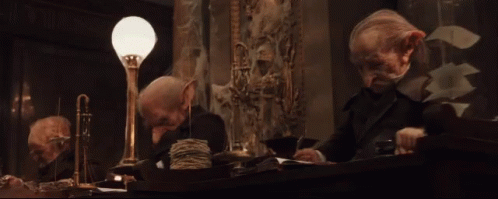Wizarding WReform: Goblin Rights
History of Magic is not generally considered to be a very interesting class at Hogwarts, but an interesting term is mentioned numerous times in the context of coursework: goblin rebellions. As early as his first year, Harry has to memorize the dates of goblin rebellions. In his third year, Hermione mentions the 1612 goblin rebellion. The following year, Harry has to write weekly essays on 18th-century goblin rebellions, indicating that the events were a somewhat regular occurrence. Professor Binns bores the class even when discussing “bloody and vicious goblin riots,” and Hermione says that goblins don’t need protection based on their cleverness and ability to stick up for themselves as demonstrated by the rebellions (GoF 392). Despite these uprisings, goblins are still oppressed and disrespected by wizards, requiring broad reform to create an equitable relationship.

Goblins have different notions of ownership from wizards, yet the former are expected to abide by those of the latter when conducting business. Although goblins resent that wizards pass down goblin-made treasures rather than returning them to their makers, they seem to have no recourse for justice. If goblins were to try to take back the pieces they made, wizards would likely call it theft, leaving goblins to be punished. There are no laws in place to require the return of items upon the death of the original buyer, likely because the laws are written by wizards. The dominant culture prevails as a matter of course, and goblins have no choice but to abide by it. However, magical contracts could be introduced that guarantee that the purchase of goblin-made treasures is only valid for the lifetime of the recipient. Taking a cue from the sword of Gryffindor, they could even be enchanted so that they disappear and return to their crafters rather than any form of enforcement being necessary.
Another grievance goblins have with wizards is that wizards refuse to share the secrets of wandlore, thus denying goblins the opportunity to extend their powers. Ron argues that while goblins may be deprived of wands, they also refuse to share their own magical metalworking knowledge with wizards. A system of exchange would help ease tensions and could even lead to advancements in different areas. Goblins could make even more extraordinary creations with wands or make other contributions to magical society, while wizards could become artisans or apply the principles of goblin craftsmanship to other fields of magic.
To make truly lasting change, goblins need to be given more of a voice and power in magical society. They should be included in the Ministry of Magic at all levels rather than relegated to going through the Goblin Liaison Office. Alternatively, should they prefer to operate separately, they should be treated as a sovereign people independent of but equal to wizards, managing their own affairs but coordinating with the Ministry as peers rather than inferiors.
The very fact that periods of goblin unrest are referred to as rebellions acknowledges a power imbalance. Lupin suggests that goblins could be tempted to join Voldemort, even though he murdered a goblin family, “if they’re offered freedoms we’ve been denying them for centuries” (OotP 85). The scales must shift so that wizards do not control what another race can or cannot do. If wizards want to conduct business with goblins, they must show a willingness to respect goblin culture, share knowledge and resources, and truly engage with the needs and desires of the goblin community.



